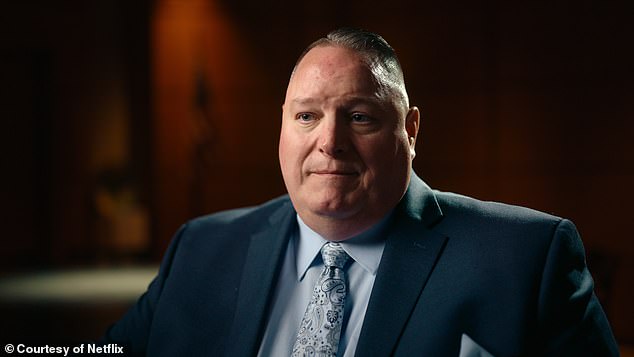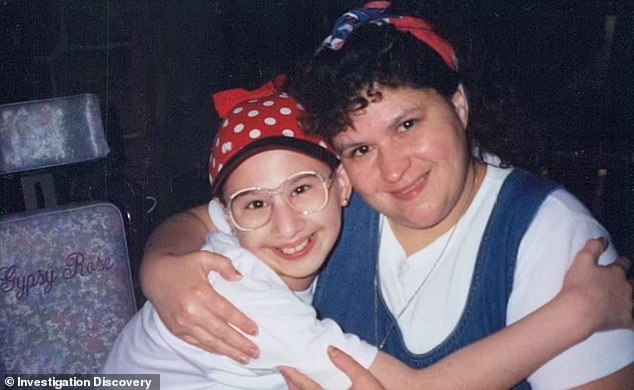Viewers all over the world were horrified by a new documentary that saw a 13-year-old be catfished by her own mother; in what some experts are now suggesting is a new psychological phenomenon on the rise.
Netflix‘s Unknown Number: The High School Catfish showed how teenage Lauryn Licari and her then-boyfriend Owen were targetted by horrific – and at times sexually explicit – messages which turned out to be sent by her parent Kendra Licari.
The victims, from Beal City, Michigan and audiences alike have been left with one question: how could someone do something like this to their own daughter?
In an attempt to find answers, some in the programme suggested a new ‘digital’-ruled disorder may be on the rise.
Speaking in the viewing, the town’s former superintendent Bill Chillman shared: ‘I think it was a cyber Munchausen’s case.
‘She wanted her daughter to need her in such a way that she was willing to hurt her and this is the way she chose to do that versus physically trying to make her ill – which is typical Munchausen behaviour.’
As defined by the NHS, Munchausen syndrome is a ‘psychological condition where someone pretends to be ill or deliberately produces symptoms of illness in themselves’.
However – Munchausen-by-proxy – now more commonly defined as Fabricated or induced illness (FII) – is ‘a rare form of child abuse which happens when a parent or carer exaggerates or deliberately causes symptoms of illness in the child’.

Netflix ‘s Unknown Number: The High School Catfish showed how teenage Lauryn Licari and her then-boyfriend Owen were targetted by horrific – and at times sexually explicit – messages which turned out to be sent by her parent Kendra Licari

The victims, from Beal City, Michigan and audiences alike have been left with one question: how could someone do something like this to their own daughter? Pictured: Kendra Licari
Famous true crime cases have seen kids be made physically sick or injured by carers – but in a new ‘online’ age, experts think it’s also opened up a portal to harm young people digitally.
Speaking to Netflix, the documentary’s director Skye Borgman said those who tuned into the show got an insight into a unique psychological situation.
‘I don’t know that she really knows why she did it,’ she admitted. ‘She does mention in the documentary an assault that happened [to her] when she was right around Lauryn’s age.
‘She talks about how scary that was for her to see her only child, her little girl, growing up, and that’s what she really relates to and that’s what she believes led her to sending these text messages and trying to keep Lauryn close.
‘To give it any sort of medical foundation is a little bit problematic… But I think that there are elements about Munchausen by proxy – about harming someone to keep them close – that definitely existed.’
Speaking to the Daily Mail, Professor Mike Berry – Consultant Clinical Forensic Psychologist – explained how the case bridges together understandings about Munchausen-by-proxy and cyberstalking.
‘Cyberstalking has increased over the last decade as it is so easy to do and how easy it is to hide one’s identity,’ he revealed.
‘Academics argue whether cyberstalking is the same or different from in person stalking but it is generally accepted that there are many similarities.

Speaking in the viewing, the town’s former superintendent Bill Chillman shared: ‘I think it was a cyber Munchausen’s case’
‘The impact on victims leads to mental health problems and becoming paranoid about being watched or reported by a stalker,’ the expert continued. ‘Leading to break-ups of relationships.’
Victims, he shared, ‘can’t trust new people, question old relationships and are angry. not believed or thought to be attention seeking by others’.
This ‘can last for years and result in loss of employment, giving up university place leading to depression and sometimes suicidal ideation’, while the stalker ‘gets a kick out of it’.
In cases of Munchausen, Professor Berry explained, people would have ‘originally been gaining attention by presenting at hospitals with various physically symptoms of illnesses to seeking sympathy and attention’, whereas in the instance of Muchausen-by-proxy, it’s all about ‘presenting usually a child as ill, often making them ill and then ending up being the heroine or saviour (“perfect mum”)’.
While some have pointed out that the case of Kendra Licari may suggest elements of a new digital ‘Munchausen-by-proxy’, the psychologist suggested, rather, that a lot of it may have been rooted in a desire for control.
‘Some research by Berry & Bainbridge, we carried out a few years ago we found that often 18-30 year olds were cyberstalked by family members who wanted to control them by fear,’ he explained. ‘Also some people did not realise they were being cyberstalked.
‘I wondered if the mother was trying to protect her daughter from sexual advances from the young boyfriend which looked a possibility until the messages became increasing vile towards Lauryn.
‘Later watching the film, it was revealed that the mother had claimed to have been raped at 17 and initially intended to protect her daughter from such risks.

Researchers have also been fascinated by the concept of a ‘cyber Munchausen’ in which people may use the internet to make themselves ‘feel’ or at least appear ‘sick’. Pictured: Nicole Elkabbas, who lied about having cancer to raise money online
‘They are obsessional in their behaviour and can and do spend hours in their pursuit of the victim – apparently the mother sent dozens of message a day at times.
‘In this case she claims she wanted to grow closer to her daughter by putting her under great stress from the messages.’
‘Interestingly she was very keen to involve herself in the school and later police investigations,’ he continued. ‘Again get attention by her ‘devotion’ to her daughter. Interestingly, there were lots of marital problems – so was this her escape route?’
The Professor added that Kendra ‘appears to be getting some pleasure or kicks out of her behaviour even though she saying it was to help her daughter’. ‘Narcissism is common in stalkers,’ he added.
‘From the film there appeared to be evidence to suggest that she was acting in a manner often seen in dissociative behaviour. It is noted that she did not appear to be genuine in her expression of remorse and was making excuses for her behaviour.’
Researchers have also been fascinated by the concept of a ‘cyber Munchausen’ in which people may use the internet to make themselves ‘feel’ or at least appear ‘sick’.
One dark trend which has emerged as a result came in the form of the cancer faker – who lies about having the illness to make money from concerned well-wishers.
In cases that have caused shock and outrage around the world, people with public platforms have later been exposed for lying about having cancer.
From influencers trying to sell their products, to people trying to fund addiction, and even those who just want attention, cancer fakers have been known to go to extreme lengths to keep up the act, for motivations that boggle the mind.
Speaking to the Daily Mail in 2023, psychotherapist and founder of the Luxe Psychology Practice Jade Thomas explained why cancer fakers evoke such fury among the general public, and explained they can be motivated by several different things.
Suggesting that people feel ‘betrayed’ by such lies after getting behind a person’s sad story, she said: ‘Most individuals know or can empathise with the devastating, distressing and traumatic experience that cancer can have on people, whether that be the patient themselves or loved ones of the patient.’
She added: ‘Individuals who malinger appear to the public to be manipulative, deceitful, and immoral.’
Dr Marc Feldman, a psychologist who is an international expert in factitious disorders, defines malingering as when people lie about serious illness for external gain.
In an interview on the Speaking of Psychology podcast, he said people who malinger are ‘going after things that are tangible’, for example, obtaining opioid medication or, if they are facing a criminal conviction, the ability to plead not guilty by reason of insanity.
This differs from Munchausen syndrome (also known as factitious disorder) which causes people to fake illness in themselves, or others, to gain attention.
In the world of cancer fakers, Munchausen syndrome has also been identified in high-profile cases where the world has been fooled into believing someone has suffered from the illness.

Belle Gibson, an Australian wellness influencer, was exposed after she lied about having inoperable brain cancer which she said she managed to cure through a regime of clean eating
Gypsy Rose Blanchard was 23-years-old when she was jailed for her part in the murder of her mother, Dee Dee, who was found stabbed to death inside her Missouri home. After Gypsy and her boyfriend, Nicholas Godejohn, were arrested over the killing, people who knew the Blanchard family were shocked – but as more details unravelled, the case gained attention around the world.
Gypsy had been the victim of abuse at the hands of her mother, who was posthumously diagnosed with Munchausen by Proxy. The mental health condition caused her to fake medical conditions in her daughter, including terminal leukaemia, to gain attention.
As well as having cancer, Dee Dee told the world her daughter was unable to walk and had the mental age of a seven-year-old. But as detectives continued their investigation it became clear that the daughter was perfectly healthy.
Speaking about the case, Dr Feldman told the Springfield News Leader at the time that Gypsy had been her mother’s ‘prisoner’.
‘Gypsy was infantilised and kept away from her peers,’ he said. ‘She was little more than a tool for Dee Dee to navigate through the world the way she wanted to.’
When asked to speculate over Dee Dee’s motives for lying about her daughter’s ill-health, he said that, while there may have been some financial motivation, for the most part the lies were for ‘the pursuit of attention and control’.
Gypsy has been out of prison since 2023.
The Blanchard story had a gruesome and bloody ending which shocked the world, but it is not the only high-profile case of a false claim of cancer to have made headlines in the last decade.

Belle, pictured, claimed she had undergone traditional cancer treatments including chemotherapy and radiotherapy before abandoning modern medicine to follow a programme of clean eating instead

Kaitlyn Dever pictured as Belle in Apple Cider Vinegar – a hit Netflix show that was inspired by the real life events
The same year that Dee Dee Blanchard was found dead in Missouri, a wellness influencer in Melbourne, Australia, was forced to admit she had lied about a terminal cancer diagnosis.
In 2013, Belle Gibson launched the @healing_belle Instagram account where she gained a large following through sharing so-called ‘healing’ food recipes.
She claimed that her lifestyle and healthy eating plan had ‘cured’ her inoperable brain cancer, which she had been diagnosed with at the age of 20 and given just months to live.
Gibson claimed she had undergone traditional cancer treatments including chemotherapy and radiotherapy before abandoning modern medicine to follow a programme of clean eating instead.
Before long the deals began to roll in, with Gibson launching an app full of recipes as well as a book deal, reportedly worth £213,500 ($420,000 AUD).
Describing her plant-based diet in her book, she said: ‘I was empowering myself to save my own life through nutrition, patience, determination, and love.’
However, in 2014, the Melbourne-based personality claimed that despite her new wellness-focused lifestyle, her cancer had returned, and this time it had spread. While many fans were devastated by the news, suspicions were soon raised about the money she claimed to have donated to various charities from the proceeds of her book.
Following an investigation by Fairfax Media, it was discovered that none of the charities Gibson had named had received a penny from her.

Gypsy pictured had been the victim of abuse at the hands of her mother, who was posthumously diagnosed with Munchausen by Proxy. The mental health condition caused her to fake medical conditions in her daughter, including terminal leukaemia, to gain attention

As well as having cancer, Dee Dee (right, with Gypsy) told the world her daughter was unable to walk and had the mental age of a seven-year-old. But as detectives continued their investigation it became clear that the daughter was perfectly healthy
The influencer’s story quickly began to unravel and in April 2015, she was forced to admit she had lied.
In an interview with Australia Women’s Weekly, she said: ‘No… None of it’s true,’ before adding she hoped people would forgive her and see that she was only ‘human’.
Two years after her admission, Gibson was fined around £215,000 ($410,000 AUD) after being found guilty of misleading and deceptive conduct.
Speaking about the Gibson story, Jade said: ‘Cases like these can have a huge influence on people.’
She added that there is a risk other cancer patients may become inspired by such fake stories and ditch modern medicine in favour of the alternative treatments being promoted, which can be ‘extremely damaging’.
Shortly after Gibson’s story was foiled, psychologist Sandy Rea wrote an article in the Herald Sun which attempted to climb into Gibson’s mind and understand her motivations.
By her assessment, Gibson did not fit the profile of someone with Munchausen Syndrome.
Rea explained that people who suffer from the disorder have an ingrained need for attention, but have little to no interest in financial gain. Gibson, in contrast, used her fake illnesses to sell books and gain app subscribers and profited from the lies she told.
While Rea didn’t attempt to diagnose Gibson in her piece, she explained compulsive liars, and noted how they can often indulge in fraudulent behaviour.
She wrote: ‘They lie repeatedly and consistently for personal satisfaction and are often criminal.’
But in recent years, a new type of cancer-faker has emerged, using tools that have only recently become available – the online fundraising crook.
In 2020, cancer faker Lucy Wieland was convicted of fleecing kind loved ones and strangers out of a total of £26,000 ($50,000 AUD) when she claimed to be suffering from ovarian cancer.
She used a GoFundMe page to collect the donations from well-wishers after winning them over with her story – even going to the lengths of posting photos of herself supposedly having treatment in hospital.
The fraudster, from Queensland, Australia, was jailed for two years in 2020 after pleading guilty to seven charges including fraud. During her campaign of lies, she even fooled her own family and friends into believing she was having cancer treatment.
While Wieland was in court for faking ovarian cancer to get money out of people down under, a very similar story was unfolding in the UK.
Nicole Elkabbas, from Broadstairs in Kent, was also convicted in 2020 of defrauding well-wishers to the sum of £45,000 – also claiming she needed the money for ovarian cancer treatment.
In a trial at Canterbury Crown Court, Elkabbas pleaded not guilty, claiming she really believed she had cancer. Jurors heard she scammed 700 people in total, using a GoFundMe page on which she posted a photo of herself looking unwell in a hospital bed.
Judge Mark Weekes sentenced her to two years and nine months in prison as a court heard she used the money to fund her gambling addiction.
Just this year, a TikTok star who claimed to have cancer and raised thousands of dollars via a GoFundMe page pleaded guilty to first-degree theft.
Madison Marie Russo, 20, gained thousands of followers on the social media platform as she documented her journey with cancer, claiming she had a tumour ‘the size of a football’ on her spine.
The Iowa-based TikToker routinely appeared in videos which appeared to show her hooked up to hospital drips – but her scam was foiled when anonymous medical professionals alerted the authorities to her campaign, having developed suspicions about the validity of Russo’s claims.
As online fundraisers provide another means to scam members of the public, Jade doesn’t believe such platforms enable cancer fakers. However, she argues they ‘might help people achieve their motive’.
A GoFundMe spokesperson said: ‘Crowdfunding fraud is a crime – and we will not hesitate to work with the police to bring those who exploit the trust of others to justice.
‘No crowdfunding platform protects its users like GoFundMe – with extensive security controls and verification technology on par with the banking sector.
‘We also have the world’s first and only crowdfunding guarantee meaning that in the very rare case of misuse donations get to the right place or will be refunded.’
In an ever growing and evolving online world, studies have been conducted into how the internet has changed the way in which people who malinger, or people who have Munchausen disorder, operate.
In the year 2000, in the earlier years of the world wide web, Dr Feldman coined the phrase Munchausen by Internet – which refers to people who fake illnesses in online spheres.
Although social media sites had not yet taken off, Feldman’s research into the phenomenon had been informed by several cases during the 1990s where people had used the internet to present themselves as seriously unwell or victims of violence.
More than 20 years on, countless forums and support groups exist online where people can speak with others who are suffering from similar medical diagnoses – and according to Jade, this could well be offering people with Munchausen syndrome another outlet through which to fake illness.
She said: ‘I think the internet might encourage or intensify Munchausen syndrome as it allows individuals to search for symptoms, google diagnose themselves and engage in influential forums.
She added: ‘Individuals with Munchausen [have] direct access into individuals experiences via support groups or forums, which allows them to mimic the experience or illness to others.
‘For individuals with Munchausen the internet or support groups might also offer a sense of community as a way of receiving attention or sympathy.’
Whereas the motivations behind malingering, where there is something obvious to gain from lying about illness, are somewhat easier to understand, Munchausen syndrome is an ill-researched condition, the causes of which are relatively unknown.
Potential explanations for the condition include emotional trauma, or true illness during childhood, or a personality disorder, but according to the NHS, the complex medical condition remains poorly understood because many people refuse treatment for it.











